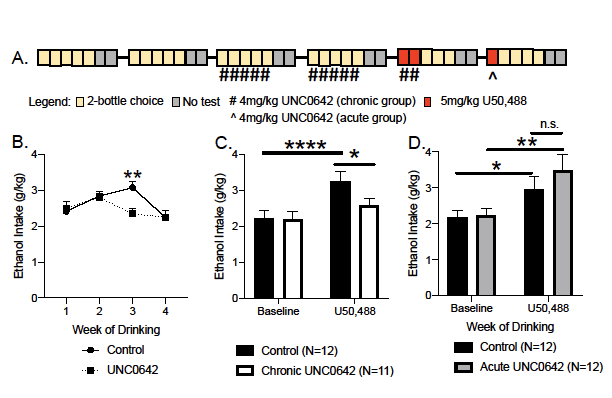Description:
Technology: Inventors at MUSC have identified that NAc (nucleus accumbens) G9a is required
for stress-regulated drinking in both ethanol-dependent and non-dependent animals.
Importantly they discovered that treating mice with UNC0642 (an inhibitor of G9a) in a stressinduced
ethanol drinking assay (Figure. 1A) showed significant reduction in ethanol consumption
during first week of daily drug injections (Figure. 1B). Further, chronic UNC0642 treatment
suppressed U50,488 (kappa opiod agonist) potentiated ethanol drinking observed in control mice
(Figure. 1C). Current treatment modalities for Alcohol Use Disorders (AUDs) such as Naltrexone
and Acomprosate are used but have side effects and have very limited efficacy in AUDs.
Therefore, alternative treatment approaches are greatly needed. Since the stress system is
dysregulated in chronic substance abusers, pharmacological inhibition of G9a activity could prove
to be a useful therapeutic strategy to treat relapse vulnerability in individuals suffering from
alcohol used disorder and substance use disorder. Additional studies are explored to determine
duration of treatment to achieve maximum efficacy. 
Fig1. Systemic G9a inhibition suppresses stress-induced ethanol drinking. A) Wild-type mice were allowed to drink ethanol for 2 weeks prior to repeated, daily injections of UNC0642 (4mg/kg; i.p.) given 30 minutes prior to the 2-bottle choice sessions (Fig.1A). B) significant reduction in ethanol drinking during the first week of daily UNC0642 injections (Fig. 1B). C) chronic UNC0642 treatment suppressed U50,488- potentiated ethanol drinking observed in vehicle control mice (Fig. 1C). D) single injection of UNC0642 failed to influence stress-potentiated drinking (Fig. 1D)
Overview: Alcohol use disorder (AUD) is a chronic, relapsing disease that is difficult to treat due
in part to co-morbidities with other neuropsychiatric illnesses like stress- or anxiety-related
disorders. In addition, evidence suggests that the chronic use of abused substances, like alcohol,
can lead to the formation of lasting stress disorders produced by dysregulation of stress-response
systems in the brain. Several epigenetic enzymes, such as histone deacetylases and histone
methyl transferases, are regulated by acute or chronic exposure to abused substances and can
influence the development of AUD related behaviors. One such enzyme, G9a (also known as
euchromatic histone-lysine N-methyltransferase 2 or EHMT2), is a histone methyltransferase that
catalyzes di-methylation on lysine 9 of histone H3 (H3K9me2). H3K9me2 is typically associated
with condensed chromatin and repression of target gene expression; and G9a is a major regulator
of this histone mark in NAc neurons. Researchers at MUSC show that ethanol dependence in
mice, produced by chronic intermittent ethanol (CIE) exposure, reduced both G9a and H3K9me2
levels in the adult NAc, but not dorsal striatum. Viral-mediated reduction of G9a in the NAc had
no effects on baseline volitional ethanol drinking or escalated ethanol drinking produced by CIE
exposure; however, NAc G9a was required for stress-regulated changes in ethanol drinking,
including potentiated ethanol drinking produced by activation of the kappa opioid receptor.
Publication: Anderson, Ethan M et al. “The histone methyltransferase G9a mediates stressregulated
alcohol drinking.” Addiction biology, e13060. 19 May. 2021, doi:10.1111/adb.13060
Applications: Alcohol use disorders
Advantages: Pharmacologic inhibition of G9a could be a new approach to treat stress induced
alcohol consumption
Key Words: Alcohol used disorders, G9a, stress induced escalation
Inventors: Christopher W. Cowan and Ethan Anderson
Patent Status: PCT/US2021/042044
MUSC-FRD Technology ID: P20144